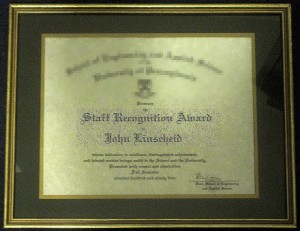 Staff Recognition Award, nineteen hundred and ninety-four: the framed certificate came home with me last week. Twenty years after having been awarded that honor, I retired from the department that nominated me for it.
Staff Recognition Award, nineteen hundred and ninety-four: the framed certificate came home with me last week. Twenty years after having been awarded that honor, I retired from the department that nominated me for it.
Gay men my age frequently identified with the stereotype, “the best little boy in the world.” Having grown up in a world that labeled us unworthy, we did all in our power to prove ourselves worthy. Knowing in our closeted hearts that we could never meet expectations, we exceeded expectations in our public lives. Even after we came out, those habits continued.
I had not planned to spend my working days as a secretary or administrator in an office unrelated to my interests. I had trained for church work—to be a Mennonite pastor. That option disappeared when I came out. So I found myself among engineers at a university, a field far from religion and the liberal arts in which I had my degrees, There, I threw myself into the tasks at hand. I learned to type mathematical equations and diagram chemical processes in versions of Microsoft Word that predated equation editors. I crammed lessons on drawing programs into my head so that I could produce figures, using equally early software. Over the years, as the software got upgraded, I also got upgraded, rising in rank to become the office manager, the top staff position in the department.
While being the best little boy in the world may have taken me there, I do not believe that it made me the best manager. Yes, I made a competent manager on the day-to-day operational level. I got done what needed to be done. However, I did not re-envision and restructure the staff in better, more productive patterns. I did not appreciably move operations in new directions.
However, I made a pretty good boss on the human level, if I may be bold enough to say that. My pastoral experience and training informed the way that I handled staff needs. A sort of secular spirituality ruled my practice of administration. I understood that humanity must take priority over time sheets. Encouragement will yield greater productivity than criticism. A collegial atmosphere may enhance not only staff experience in an office but also the reputation of the office itself. Common paradigms divide sacred and secular, the spiritual from the material. My experience tells me that a deep spirituality may positively inform even the most secular of pursuits.
In my seminary days, I never imagined that at least one “congregation” I would be called to serve would be a secular one. I hope it proved to be a successful “ministry.”
I know that those whom I left behind when I retired graciously downplayed my missteps and emphasized our successes. But their “benediction” made me feel like the best old boy in the world.
